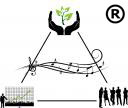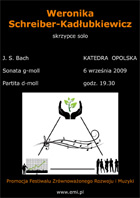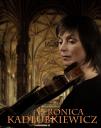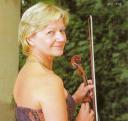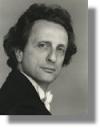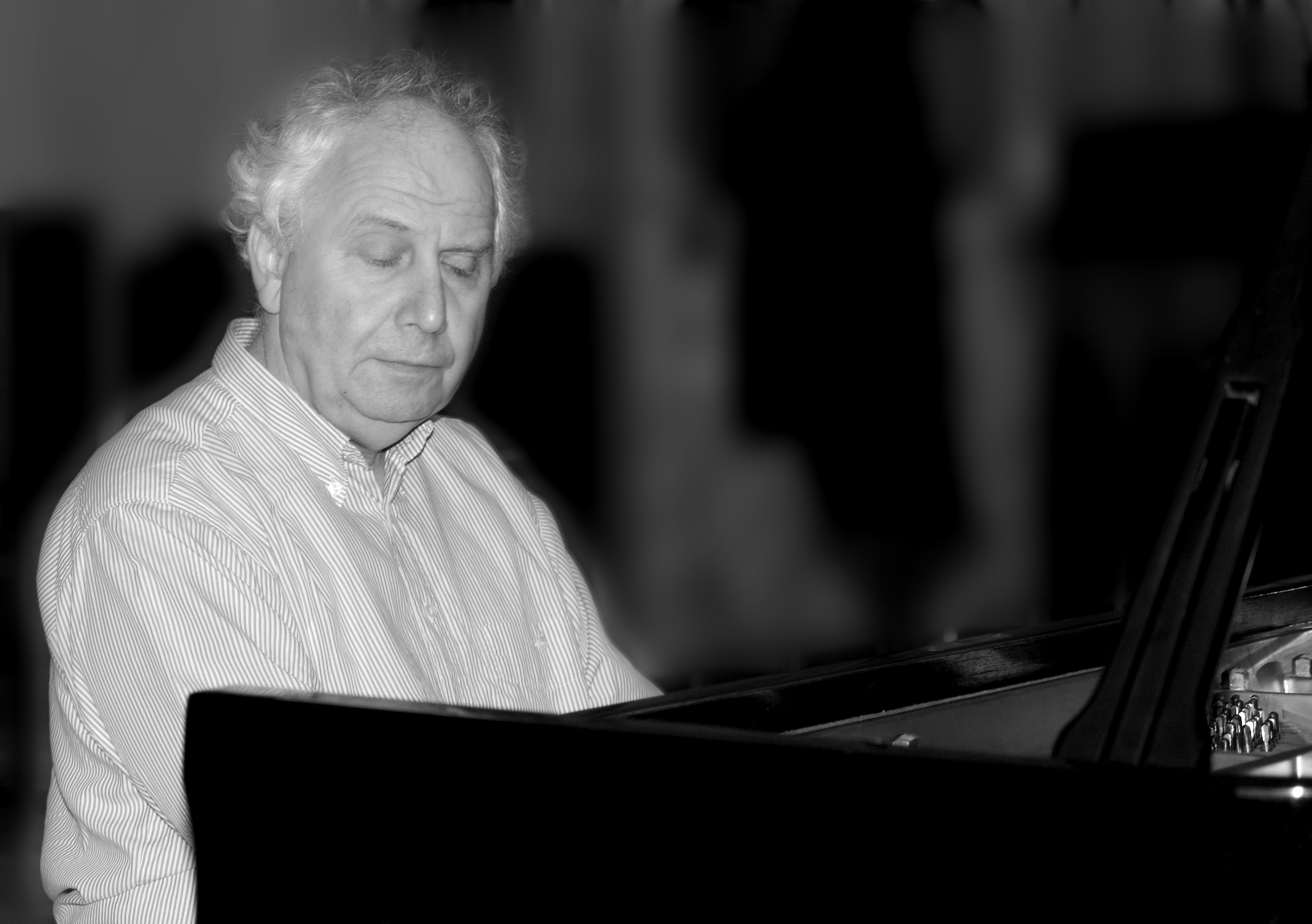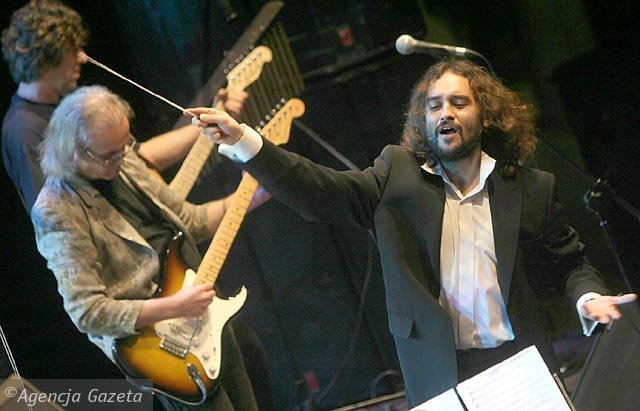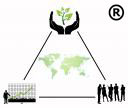Archiwum z miesiąca: October, 2007
From the review of Polish Publishing House ARKADY, the publisher of “Violin and my life” by Yehudi Menuhin: “… in our noisy, chaotic world violin talks to us with such a clear tone that its music unites people all over the different epochs, cultures and languages…”
Yehudi Menuhin”We are surrounded by more and more noise which is getting unbearable the more so it is meaningless. Although it ceased to have a function of a signal, it has kept its aggressive tone… We are living in a world in which there is a primacy of vision over hearing. The image is crucial. Some people are still able to listen what the world whispers and they talk about vibrations that can be felt in certain places or can be transmitted by somebody’s voice. But generally, we judge the world by its image…Being limited by our visual perception and through it, also by sense of touch, we are doomed to contacts via intermediaries. The world has turned into one big commercial advertisement because our visual perception limits us to appearances. The eye leads us but it can also mislead us, whereas music can not be misleading because it is a part of the reality and reaches us directly. It reaches us from the deep of Absolute, not from its echo. Music can interfere with Absolut and change it. I had an occasion to observe ( thanks to the MUS-E project (Music, Source, Equilibrium and Tolerance – music as a source of equilibrium and tolerance)) miracles that music has caused…the aim of the project is to introduce singing and dancing into curriculum of schools for children from underprivileged families. Contact with music allows them to gain emotional equilibrium although the lessons take place only few hours per week. The classes produce spectacular results, one can see that the music influences these children in a way that their personalities are blooming, their sensibility is being developed, they can better manage interaction within the group, have a better improvisation and creativity skills to end up with more retentive memory. These children have better results in their school exams. It is as if under the influence of music vibrations, the children undergo a metamorphosis. The lack of confidence as well as prejudices, fears and aggression cease to exist…In today’s world music and dance are the antidote to aggression…the stabilizing influence of music and body movements combined with calm and concentration which are being brought along, is the concrete fact. There is no better way to guarantee a psychological well being of society and to achieve harmony between people…”
Of course we are not talking about concert halls and cinemas that have bad acoustics….
The article from website http://www.eurodialog.org.pl/ :
” Yehudi Menuhin, Culture and Peace.
We are witnessing today a growing violence, a dissolution of reverence, whether for religions, patriotisms, conventions, a withering of reverence for women, children and family, a brutalization of feeling, whether for nature or for life, and a loss of tenderness and compassion for the humble, the exploited and the suffering.
We are witnessing the accompanying orchestration of ruthlessness in humanity, of civil war and aggression, even in trade, even in schooling, on the streets, together with a general reversion to basic black-and-white simplifications, a form of fundamentalism which is invading all thought.
As against this dismal picture there are other novel and hopeful aspects for the dawning 21st century. One is the stripping-away of man’s self-glorifications, prejudices, false illusions, hypocrisies, and the laying-bare, figuratively and literally, of body and soul through our deeper knowledge and understanding of each. Will the good and the hopeful triumph over the evil? That seems to be the question today, and the very difficulty of its answer lies in the close and intertwining relationships of good and evil. We are moving, literally, towards dead ends at accelerating speeds; economic well-being is taken to represent continuous growth requiring the ever greater plundering of our resources, the pollution of all we breathe and swallow, and is threatening social revolutions as the increasing gaps and tensions between the rich and the poor grow. The collapse of democracy in favour of totalitarian regime is already in the air. At the same time we are searching for models of sustainability, whereby people’s talents and time and nature’s resources can be accommodated into civilised patterns without endangering our progeny and condemning them to ever greater misery.
The development of new and creative values – introspective, objective and revealing – should in no way be interpreted as a denial of the sacred but rather as a peeling-off of the masks, the costumes and vestments which we have often abused as symbols of a sacred realm, separated from everyday life, often to clothe our own sins and crimes. To oppose these menaces we must one day restore certain areas of life to that respect and reverence which many so-called primitive people have understood as being essential to mankind’s survival. Today not only our children and our trees but all children and all trees should be considered with reverence.
Certainly, one reason for the demise of organized “rational” Communism was its negation of the sacred. As practised by Jesus, of the Essenes, this high concept of a community of sharing found its expression in a most devout religious feeling. It is the very same absence of the sacred from our capitalistic free market – (whether we sell and buy ourselves, other human beings of every age, or drugs, arms, coal, oil, timber, or natives) – that is accounting for the present downfall of civilizations which counted democracy and freedom of thought and expression amongst their sacred virtues. For in order to dominate, persuade or govern ever larger diversities of human cultures and geographical features, it is necessary to come not only with superior means of subjugation – weapons for both instant and delayed action – mortal arms and economic strangleholds – but also with an ever more universal doctrine – or shall we call it an ever wider slice of truth?
There is no doubt that the missionaries who brought the promise and the realization of an ever wider application and acceptance of a moral code, the promise of salvation, the threat of eternal hell, especially when evoked against the doctrine of equality, justice, and a benign Father protector exercised a wider appeal than any tribal religions could possibly have done, adapted as they are to local needs but lacking in that concept of total equality, universality of justice, absolution of sins and a divine protection which only the “one true God” could ensure. The Jewish Faith, the Catholic Church and Protestantism are still commanding religions, and many churches have proliferated, some crassly exploitative of human beings and tax-free status, others most high-minded – the Seventh-Day Adventists, the Bahai, Quakers, not to speak of another great offspring of the Jewish Faith – Muhammedanism, historically a noble religion which has in some respects not evolved out of the age of Empire and Messianic ambitions – rarely having participated in the democratic advances of hard-won freedoms and representations.
But no religion today the world over questions the basic principle of monotheism, because it is already more than a half-truth. Not only is the “Maker” one, but the relativity of all else to the one, of light to matter – light being liberated matter and matter being imprisoned light – and now already dawning the truth of the relationship, the equation between the organic and the inorganic, between the inanimate and animate chemistry all go to prove that the universe does not rotate around man nor that god was anthropomorphic, but that living and developing intelligence is supreme. There can be no doubt about our all belonging to the one continuous creation, of which we are as much the motive as the passive part. I believe this credo raises man’s role of intelligence and responsibility to its highest potential whilst placing us as human beings humbly serving a cosmic intelligence greater than our own, leading us to the seat of revelation. What is certain is that we can be both proud and humble; proud of belonging to a living destiny and humble in our reverence for the greater intelligence vested in all consciousness.
However, traditional monotheism in its concept of oneness is still only a little more than a half-truth so long as it excludes two principles: a) Oneness must imply that God is not apart from His creation; he inhabits and is part of every atom and cell. Infinity, eternity and constant creation possess us inexorably, as does the religious spirit. Man is by definition a religious animal, possessed of free choice and responsibility. b) The principle of infinite diversity must be regarded as equally sacred as the principle of oneness, and to this extent the pagan and the animist must be accorded their own rightful share of the sacred. My own personal belief is sympathetic to the conviction of many animist creeds and of our own Druids – God does inhabit the trees – and I believe the Catholic Church is strongest partly because it has tacitly admitted and never completely broken with the pagan – unlike Muhammedanism and it parent Jewish tradition of never defining or drawing the Maker or the Made.
It is noteworthy that the oldest and founder religion of our western faiths – the Jewish and the least superstitious – has itself had a very minor role in proselytizing. Not only had the Jews for thousands of years no temporal power – state, army or fleet – they were people of the Book – and, no more than the Quakers’ was their empire of this world. Literate, philosophizing, communicating in and refining the abstract in words and numbers, the temple, the school, the home and the family substituted for empire-building and the lust for power over others. They were also the keepers of the Ten Commandments until a Jewish state was “re-“formed, a difficult admixture of cultures and state. They never failed to be the lightening-rod for persecution – religious, racial, and now national – hardly an attractive choice for conversion! I am afraid that their (our) Lord is reserving yet more punishment for this oldest of persecuted great peoples – in His careless and indifferent acceptance of the consequences of free choice. The Holy Land has never, as far as I know, been self-governing since Biblical times, when Semitic tribes conquered the land. If it is today again self-governing; it should become, as King Hussein said to me, a Semitic Federation.
The theme of my discourse tonight is the relationship of Culture to Peace. We have touched upon religious aspects of cultures but have not considered the purposes of Peace. The belonging to and acceptance of a given culture is essential to the security, the continuity required to till the land, to educate the children, to pursue knowledge, to create visible, audible and lasting confirmation of any given culture. The sacredness of Church, often above and beyond King and country, accounts for the cathedrals, chapels, the music, the formal arts, the schools, imposing formal frames of behaviour in their demand for widespread reverence and respect on the earlier, more narrow and basic folk-cultures. Thus, any given culture is an admixture of the sacred and the temporal, of what can loosely be described as higher and lower, between what we might call the eternal and the permanent. We require a degree of permanency to ensure the security of successive generations, to pursue its culture research, science, art and commerce, but we cannot enjoy these fruits of civilization without a relationship to the eternal, which, I believe, we are now beginning to acknowledge.
Some cultures are purely predatory, preying on the accumulated reserves of the more stable, often destroying them; others, as Sparta, were purely military. Some were a mixture of would-be world dominators and great cultures – Germans, Japanese, and in its own way the Soviet Union – joining the military with the message. Germany tried through Goebbels et al. to formulate a message, but it was pathetically bare and condemned to defeat as it was limited to the superiority of Aryans! Some cultures were purely peaceful, others – the Polynesians, Eskimos, Red Indians – had no defence against our God and our Gun.
The age of Western Empires produced joint efforts of great distributions of similar colours on world maps, being the result of joined warrior and priest. It may be argued that England planted the element of parliamentary democracy and commerce more firmly than other Empires. A secure and beloved homeland played at Empire more successfully than others because it formed men of every estate and class who, for different motives, were disposed to risk their lives and fortune at games; winning came easily because sportsmanship and trade were all-important.
Today we have states and cultures of all sizes, all descriptions, from the newer global cultures of science, technology, commerce and communication to communities of nations, European, Commonwealths, to national, regional, nomadic, immigrant, inner-city; we encounter both the minute and the international aspects of these in conventional and confrontational situations. Waves and tidal waves of violence erupt in our Iives and usurp our time, our peace-of-mind, our security, our very consciousness. We live in a patently disordered world in which new forms, new patterns of order, some more enlightened than others are emerging. Some should be obsolete but are making a last desperate stand – forms of brutal fundamentalism; by contrast various small youth communities, as the original San Francisco flower people, or their opposite number – inner-city gangs – coalesce. Above all, these most advanced, intellectually alert and open-minded international global youth, sharing the same personal and global anxieties, are committed to a better world -socially, ecologically and spiritually. This global youth is prepared to fight for global human values but, I believe, will not engage itself out of national pride any Ionger. This is one reason why modern professional armies are, in fact, in a sense mercenary armies and why the Russian, the Chinese, are essentially people’s armies, as the Swiss still are. These armies must eventually be replaced by an imposed social-cum-military community or world police with the highest standards of public service and committed to the protection of the weaker – women, children, poor, hungry, crippled, sick, weak and homeless – even, upon occasion, “lawbreakers”.
The instantly brutal is invading the realms of cultivated and subtle expression. Our five senses are assailed with mortal effect – to quote the last words in Hamlet, (a massacre) “of sound and fury signifying nothing”. Nothing is more revealing of the eternal truth of Shakespeare’s words. On television, genocide, killing and torture; in our media a constant stream of degrading sensations, reports and gossip as against that never-never land of enticing advertisements where we learn the purity of purchased bliss. We suffer the noise of road drills or the forced feeding of music, deafening decibels at discotheques. These insults to our senses of hearing, smell and taste are brutalizing and are a symbol of the confrontation between human beings and their different needs. These divisions make ever less sense in a world ever more dependent on itself, and one in which each of us is dependent on so many other people and furthermore a world in which we instantly react to events all over the globe. Yet we must ensure peace for each and for all. I will now speak of the conditions for such peace. Such peace must allow for the full unfolding of our talents, our gifts for self-expression, for otherwise they fester, ferment, rot and destroy. The societies we envisage must be bound by a sense of belonging to ever-widening concentric circles or spheres of common dependence and interests. Such societies must be as robust as they are subtle and must allow man, the religious animal, the full expression of his feeling and his faith in eternity and mystery of life in its oneness and in its diversity. He must live creatively, yet with profound respect for nature and the ways and freedoms of his co-habitors.
His formation must begin at the earliest age with the refinement of his senses, first and foremost the sense of hearing, of voices, of music, of memory, of surrounding space. Yet, even before, there must come in chronological order the sense of immediate touch, skin and tongue, the warm and protective, the caress and, of course, inevitably, the unpleasant, hurtful or corrosive. Speech and music are but extensions of the tactile as vibrations from beyond us set up vibrations on and in our ear drums, i.e. within ourselves. Our hearing, unlike our sight, which is directional and confrontational (subject v. object), is global and all-embracing. Our eyes should rest on the green of nature, on the sky, on the stars and the moon, on the seas in all their moods, on sources of sounds which occasion human reaction, protecting, comforting, meditating, but also frightening in small inoculative doses, whilst learning to defend ourselves, or to avoid, to intervene or to ignore. Writing and reading are visual skills which cannot really flower until listening, thought and speech are fully evolved. The senses of fantasy and observation by singing, drawing, painting, reciting by composing poetry and music, by mime, by acting, the control of our body and its health by a knowledge of nutrition and training in various disciplines – yoga, Taichi, martial arts, paired with movement and dancing as with singing from the earliest moments possible – constitute a child’s world and are the basic formation which must precede the abstractions of reading, writing and calculation. The cultivation of though and speech is far more important than of reading and writing because it is basic. Dreaming, talking, indeed even philosophizing, must precede abstract study.
The aural is more is more important than the written, however less advanced it may be in terms of recorded knowledge and wisdom. The aural represents, however, our accumulated wisdom and constitutes our separate cultures. We tend to spurn the aural in our civilizations and in civilizations which have evolved the aural to a very high degree of memory and social responsibility. But with the incredible advance of memory banks, computers capable of thinking in a manner, man’s and woman’s and a child’s inner world, inner life and integrity must be protected and encouraged. This is what I am attempting to achieve with the schools project MUS-E and with the project for the representation of cultures, as distinct from the political representations of nationalities. For this project to work it is essential that both the European Community and the Cultures recognize their respective reciprocal responsibilities. The Community as ‘Guardian of Cultures’ in the words of President Higgins, and the Cultures as supporters of the Community and of its functions. My very modest Foundation in Brussels, The International Yehudi Menuhin Foundation, is engaged in these tasks to help guide our European Community towards a balanced harmony in which autonomous cultures would be represented and protected by the European Community whilst themselves supporting the Community. The “porteparles” would have to be individuals fulfilling four qualifications:
a) the trust of their group,
b) the unquestioned authority and knowledge of the subject under discussion,
c) the ability to talk to an ‘enemy’,
d) of course no terrorist.
Once a mission or task has been successfully accomplished, that person would be eligible for a five-year appointment to an Assembly of Cultures meeting twice a year. We are intent on reviving and inspiring a genuine European conscience conceived in the image of what the integrated diversities of Europe have already brought the world – in music, in language, in literature, in science, in parliaments, in democracy, in open-mindedness and in social conceptions in advance of many other parts of the world. One of the most inspiring examples of man’s thought was the establishing of the United Nations Educational, Scientific and Cultural Organization (UNESCO). It was conceived in London by a wonderful group of men of great vision – Julian Huxley, the great biologist, was its first President – and it was to be totally apolitical, the counter-part of the United Nations. I am glad to say that in the hands of Federico Mayor it is in a strengthened way fulfilling its original concept of bringing the world together in the recognition of our responsibilities and obligations in the realms of education, of art, of heritage in all forms, from music to ancient architecture, of relief to the destitute and abandoned children in the streets of Sao Paolo and to hundreds and hundreds of wonderful human and humane initiatives taken throughout the world. I continually regret that the United States and England following in dutiful echo renounced UNESCO some years ago and are still refusing to rejoin this great human global organization. These thoughts occurred to me last Christmas Day. I feel humanity is passing through a very crucial time. We must all hope and pray for the triumph of good over evil, whilst recognising that it is possible to transform the negative into positive energies. This dynamic and living state of peace will require as much courage, faith, philosophy, compassion, foresight, reasoning as ever did any war in the past. ” Material from http://www.eurodialog.org/
Kategoria: Articles and reportage | Komentarze wył. »
 They’ve met in 2006 in Paris…a place between Poland and Argentina…She – Polish, born to a musical Silesian family, plays classical and contemporary music all over the worldHe – born in Argentina, the cradle of tango, to a family where everybody plays tango on different instruments…
They’ve met in 2006 in Paris…a place between Poland and Argentina…She – Polish, born to a musical Silesian family, plays classical and contemporary music all over the worldHe – born in Argentina, the cradle of tango, to a family where everybody plays tango on different instruments…
They’ve met in tango…
Duo Cordato is inviting you to a tango, an emotional journey via laughter and fascination, flirt and jealousy, passion, sensuality and love. Manuel Romero said: “Tango is not only a dance. Tango is a kind of lifestyle, state of mind and philosophy. Tango was born from the very deep inside of a human soul and therefore its language is understood by every human being.”
Tango was born in the street. Today it is being played in grand concert halls and danced everywhere.
Tango is a ballroom dance originating from Buenos Aires in Argentina and Montevideo in Uruguay. Habanera and flamenco, the Spanish traditions transplanted to South America, mixed with “candombe”, the dance of African slaves performed and sang at street parades, are at its roots. The word “cum-tan-go” is being repeated in the refrain and this is where “tango” comes from. With a time “candombe” was transformed into “milonga”.
Astor Piazzola (1921-1992) was a musical genius for whom the national dance became a raw material on the basis of which he has invented a completely new music genre. He raised the status of tango from town music to classical music. Piazzola was a great visionary composer, recognised internationally. Unfortunately, he had to fight with the lack of understanding in his own country.
Kacper Podrygajło has written: “In Piazzola’s music the Bach tradition clashes with dances originating from Buenos Aires brothels…In the Baroque tradition everything was mixed up and nobody paid attention to possible misalliance. Gigue (old French ham) was worshiped and by means of this act became an integral part of the Baroque mass. Da chiesa sonata rarely occurred alone. Suite was composed of a cycle of dancing pieces which usually differed from their original versions. We find the same in Piazzola’s music. He writes tango in such a stylized manner that each piece of music differs from each other and, at the same time, they are identical with what they do not represent. However, it does not mean that they are written in a way Bach would have written them if he had lived to our days.”
Duo Cordato with Veronica Kadlubkiewicz violin and Sebastian Cordato guitar and voice perform music of Astor Piazzola’s as well as their own improvisations on dancing music from Argentina.
Kategoria: Duo Cordato | Komentarze wył. »
Hope is the mother of the wise
Courage is the crown of life
Man is an artist by nature
Preserve your dignity by all means
Love is your light
Time is your friend
Love the truth
Lead a dignified life
Make the Earth a beloved treasure
Kategoria: Articles and reportage | Komentarze wył. »
Café 1930 – Astor Piazzolla.mp3
Bordel 1900 – Astor Piazzolla.mp3
Milonga del Angel – Astor Piazzolla.mp3
Kategoria: Duo Cordato, Music | Komentarze wył. »
Astor Piazzolla and dancing rythms of Argentina
about 35 minutes of music of Duo Cordato
Weronika Kadłubkiewicz violin i Sebastian Cordero guitar and singing
| Astor Piazzolla | Bordel 1900 |
| Cafe 1930 | |
| Nightclub 1960 | |
| Concert d’aujourd’hui | |
| Libertango | |
| Milonga del Angel | |
| Improvisations based on dancing music of Argentina | |
| Payadora | |
| Palomita Blanca | |
| Milonga de mis Amores | |
| Los ejes de mi carreta | |
| Nocturna | |
| Cueca del violin | |
Kategoria: Duo Cordato | Komentarze wył. »
